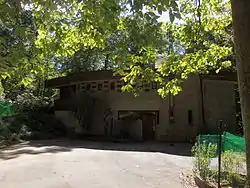Robert Llewellyn Wright House
The Robert Llewellyn Wright House is a historic home located at 7927 Deepwell Drive in Bethesda, Maryland. It is an 1800-square foot two-story concrete-block structure designed by architect Frank Lloyd Wright in 1953, and constructed in 1957 for his sixth child, Robert Llewellyn Wright (1903-86), who worked at the Justice Department.[2]
Robert Llewellyn Wright House | |
 Robert Llewellyn Wright House, September 2012 | |
  | |
| Location | 7927 Deepwell Drive Bethesda, Maryland |
|---|---|
| Coordinates | 39°0′27.71″N 77°10′0.62″W |
| Area | 2 acres (0.81 ha) |
| Built | 1957 |
| Architect | Wright, Frank Lloyd; Beharka, Robert |
| Architectural style | Hemicyclical, Usonian |
| NRHP reference No. | 86002621[1] |
| Added to NRHP | August 12, 1986 |
The Usonian house was designed using intersecting and concentric segments of a circle, or "hemicycles". Initial designs were scrapped after the construction was too costly.[2]
The house can be seen from Deepwell Drive on a sloping lot that overlooks a stream. It is also visible from the Cabin John Stream Valley Trail, which follows the Cabin John Creek below it. In 1960, the grounds were landscaped by Lloyd Wright, brother of the client, and the son of the architect.
As of 2010, the house was inhabited by Tom Wright,[3] grandson of Frank Lloyd Wright, and a volcano specialist.[2]
It is one of only two Wright-designed structures in Maryland; the other is the Joseph Euchtman House in Baltimore County.[4]
See also
References
- "National Register Information System". National Register of Historic Places. National Park Service. July 9, 2010.
- McKeon, Nancy (21 August 2010). "A family home, a family legacy". The Washington Post. pp. E1, E4. Retrieved 21 August 2015.
- https://bethesdamagazine.com/bethesda-magazine/september-october-2009/the-wright-house/
- Peter E. Kurtze (February 1985). "National Register of Historic Places Registration: Robert Llewellyn Wright House" (PDF). Maryland Historical Trust. Retrieved 2016-01-01.
- Storrer, William Allin. The Frank Lloyd Wright Companion. University Of Chicago Press, 2006, ISBN 0-226-77621-2 (S.358)


